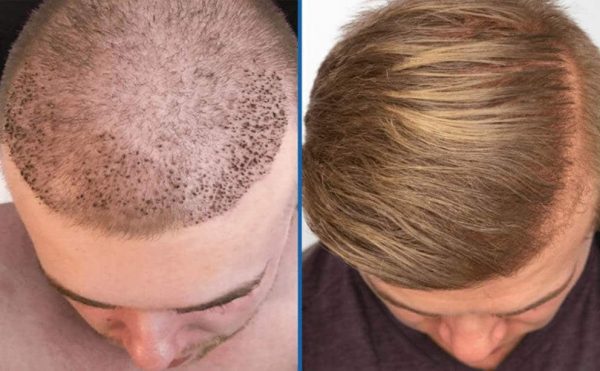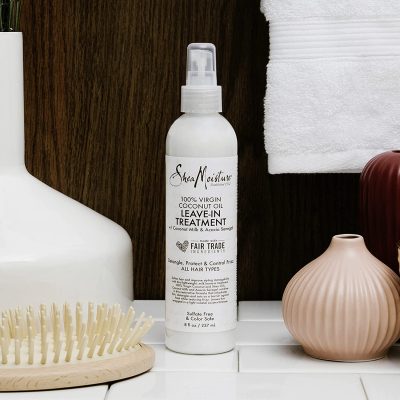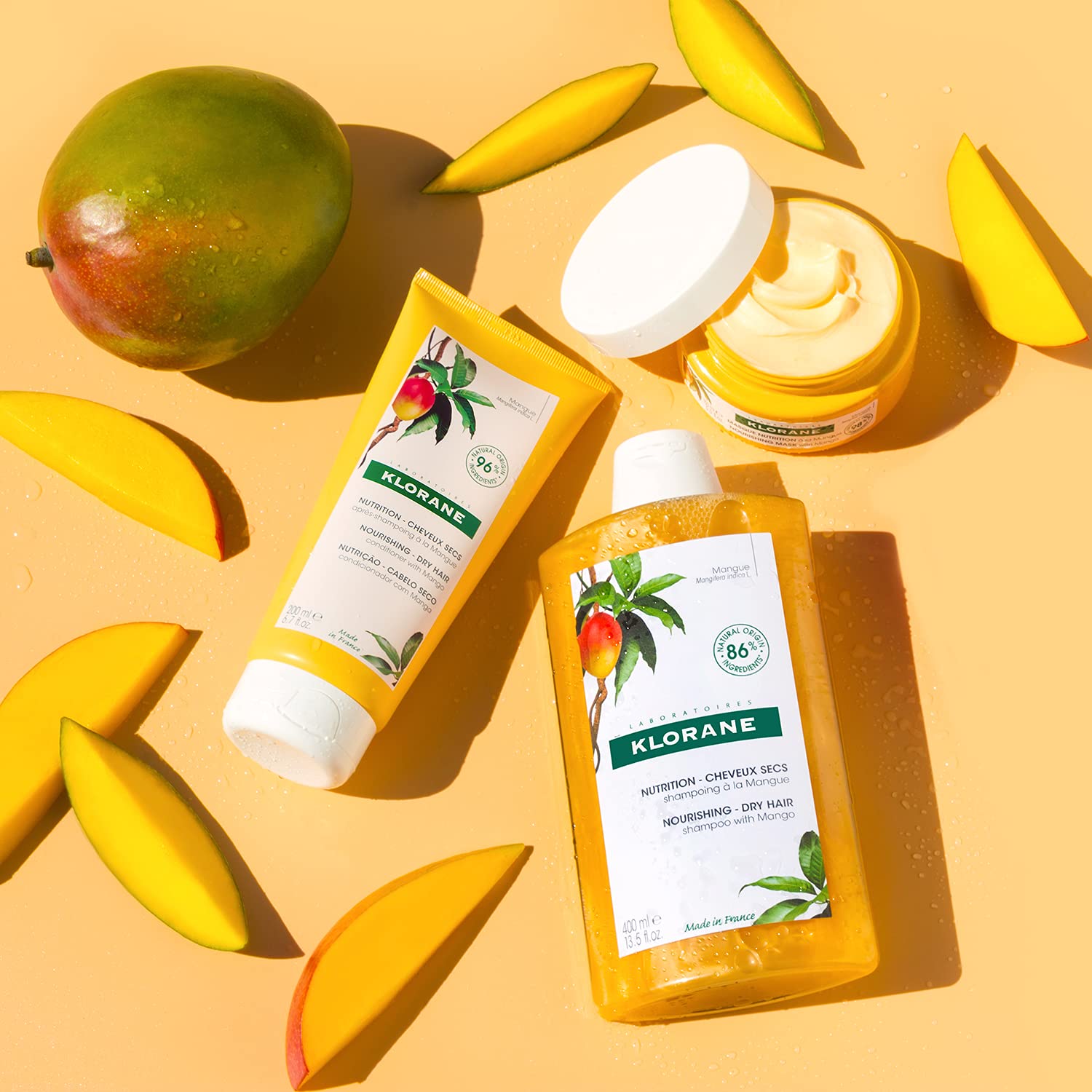Hair growth vitamins and supplements almost seem too wonderful to be true. Is it possible to grow your hair longer, stronger, and healthier by taking a tablet once or twice a day?
A multitude of factors can contribute to hair loss or thinning hair, including nutritional deficits. While vitamins and supplements are not a cure-all, the appropriate ones may make a difference in the way your hair looks and feels.
Here are the greatest vitamins for hair development, as well as a few supplements that specialists prescribe.
What Kinds of Vitamins Promote Hair Growth?
A variety of variables impact hair growth and health, including nutrition, genetics, medical problems, hormones, and even stress. According to research, a lack of vitamins and minerals required for regular cell development and function may contribute to hair loss.
“Vitamins are crucial for good hair development and may help reduce hair loss and thinning,” says Michele Green, M.D., a New York cosmetic dermatologist. “B vitamins, vitamin D, vitamin E, zinc, biotin, and iron are the greatest vitamins for hair development.”
Vitamin B
Complex B vitamins help with hair development and are “important for metabolism and nervous system function,” according to Dr. Green. “It’s no surprise that B vitamins like B7 (biotin) and B12 are crucial for hair strength and conditioning.”
According to research, eating a balanced diet allows you to easily meet your daily B vitamin requirements. B vitamins are present in a wide range of foods, including whole grains, meat, fish, whole eggs, almonds, and avocados.
Biotin
Biotin, often known as vitamin B7, is a complex B vitamin that is frequently promoted for its hair development properties. And part of the buzz may be justified. According to Dr. Green, biotin has a role in “forming red blood cells, which bring oxygen and nutrients to the scalp and hair follicles.” It also “plays a role in the creation of keratin, which is a major component of hair.”
According to the National Institutes of Health, most people get enough biotin through their diet. Eating biotin-rich meals is the best method to obtain more.
Milk, eggs, bananas, salmon, sweet potatoes, and almonds are all recommended by Dr. Green. If you believe you need an extra boost, consult your doctor—many biotin pills for hair, skin, and nails considerably surpass the recommended daily dosage.
Check out: Best Biotin Shampoo To Get Fuller & Thicker Hair
Vitamin C
Vitamin C is not just excellent for immunity; it may also strengthen hair. According to Dr. Green, vitamin C is crucial for good hair development since it is a potent antioxidant. “Vitamin C promotes blood circulation throughout the body, including the scalp,” she explains. “When there is enhanced blood circulation to your scalp, your hair follicles are stimulated, which may assist encourage hair growth.”
Iron
Iron, unexpectedly, has a function in hair development as well, and study published in the Journal of Korean Medical Science reveals a relationship between iron deficiency and female hair loss.
According to Dr. Green, this vitamin improves circulation and helps deliver oxygen to your cells more effectively, which may benefit in hair development. “If you don’t get enough iron, your body won’t be able to create enough hemoglobin, which can impede oxygen supply to your scalp and lead to hair loss,” she explains.
She suggests consuming iron-rich foods such as clams, red meat, spinach, and lentils. If you are at danger of iron deficiency, you should consider taking an iron supplement, but see your doctor first.
Keratin
Dr. Green explains that keratin is a protein that is found in our hair, skin, and nails. It is naturally generated by the body, and several keratin supplements claim to aid with hair development.
Dr. Green, on the other hand, recommends “supplementing” with keratin in a more natural way—by consuming protein-rich foods such as eggs, beans, fish, and meats—rather than taking a tablet.
“There have been no convincing studies that demonstrate keratin aids in hair development,” she explains. “In addition, excessive keratin supplementation might be detrimental owing to increased protein accumulation in the body.”
You may also like: Best Keratin Treatments For Your Hair In 2023
Vitamin D
According to Dr. Green, a vitamin D shortage can cause hair loss. “Keratinocytes, skin cells that create keratin, metabolize vitamin D in the skin,” she explains. “When the body lacks vitamin D, the keratinocytes in hair follicles struggle to facilitate hair development, resulting in shedding and hair loss.”
Spoiler alerts: Could Vitamin D Deficiency Cause Hair Loss?
Zinc
Zinc is a trace mineral that the body only requires in trace levels. It’s little but powerful, and it’s involved in everything from cell development to DNA creation. “Low zinc levels have been linked to hair loss and poor wound healing,” explains Dr. Green. She suggests consuming zinc-rich foods such as meat, beans, nuts, and seeds.
If you suffer from hair loss or thinning, you should talk to your doctor about whether a zinc supplement is good for you. According to one tiny research, zinc supplements should be administered to alopecia patients who have low serum zinc levels.
Vitamin A
Vitamin A may aid in hair development, but there is a catch: consuming too much of it may result in hair loss. According to Dr. Green, vitamin A is a set of chemicals that includes retinol, retinal, retinoic acid, and provitamin A carotenoids.
“A research with mice found that dietary vitamin A activated hair follicle stem cells,” she explains. “However, this is complicated… On the contrary, there is evidence that excessive vitamin A administration is associated to hair loss.”
She points out that, while vitamin A deficiency can lead to hair loss, it is not prevalent in the United States, and that there is no reason to supplement unless you have confirmation of a deficit.
She suggests eating foods high in vitamin A, such as leafy greens like kale, spinach, and broccoli, orange vegetables like carrots, pumpkin, and sweet potatoes, and yellow veggies like squash.
Other Hair Growth Nutrients
The vitamins and minerals mentioned above aren’t the only ways to increase your hair’s health; Dr. Green mentions that certain oils, such as rosemary and coconut oil, may also aid in hair development. According to one study, using rosemary oil consistently for several months resulted in an increase in hair count.
In another study, coconut oil was shown to be the only one that decreased protein loss in both undamaged and damaged hair when used as a pre-wash and post-wash therapy when compared to mineral oil and sunflower oil.
Hair Growth Supplements
In addition to a diet rich in all of the hair vitamins and supplements that can influence hair development, there are a variety of over-the-counter supplements oriented specifically at persons experiencing hair thinning or loss. However, like with any supplement, see your doctor first.
Experts prescribe the following hair growth supplements.
Nutrafol
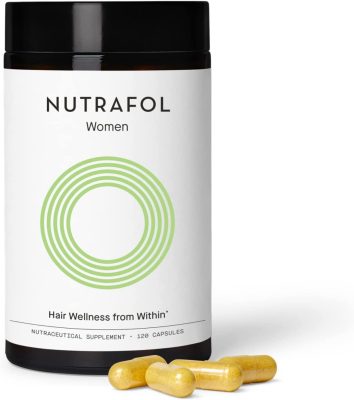
Nutrafol is a supplement line that promotes hair development, thickens and strengthens hair, and reduces shedding. The company distributes a variety of supplements, including one for women, one for postpartum women, one for menopausal women, and one for males.
Dr. Green, who is a member of Nutrafol’s physician network and distributes the supplement through her office, advises Nutrafol if you’re seeking for an effective hair growth supplement.
“I enjoy Nutrafol supplements since the brand and products cater to people of all ages and genders,” she explains. “It is made entirely of natural substances that tackle the root causes of hair loss, such as stress, DHT, free radicals, and nutrition.”
Saw palmetto, which she claims “prevents the conversion of testosterone to DHT [the hormone associated to male pattern baldness],” is one of Nutrafol’s products for males. Meanwhile, ashwagandha is included in Nutrafol for Women, which she claims “addresses the harmful effects of chronic stress by regulating cortisol, a stress hormone.”
There are additional products created with organic maca root for women over 45 years old that “support healthy female hormone balance and lead to improved sleep, good mood, and fewer hot flashes.”
Nutrafol also includes vitamins A, D, and C, as well as biotin and zinc.
Viviscal
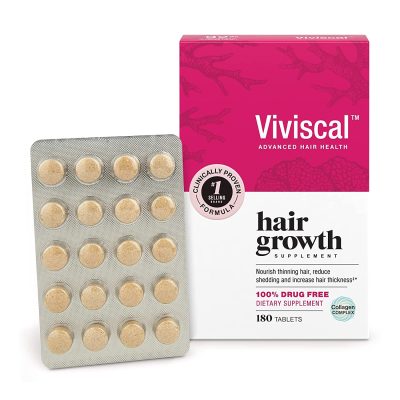
Viviscal is another hair growth supplement product. The company provides vitamins for both men and women, as well as a variety of haircare products such as shampoos and conditioners.
Dr. Green recommends Viviscal for hair development because “it is completely drug-free and contains nutrients like vitamin C, biotin, and other necessary amino acids.”
Hum Nutrition Hair Sweet Hair
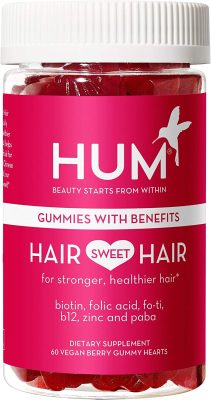
Hum Nutrition’s Hair Sweet Hair is a series of vegan candies meant to strengthen and moisturize hair, promoting growth. Dr. Green recommends these gummies because they include biotin, folic acid, vitamin B12, and zinc, among other compounds that have been found to improve hair follicle health and prevent hair loss.
“These are made with all-natural, clinically-proven substances that can make a difference in your hair with regular use,” she explains.
When Should You See a Doctor?
Dr. Green explains that it’s typical to shed 50 to 100 hairs every day, which may appear excessive. Many people associate hair loss with aging.
However, there are times when a trip to the doctor is necessary. Dr. Green suggests consulting with a board-certified dermatologist to discuss your choices.
“Getting therapy for hair loss early on can help decrease total hair loss and boost treatment efficacy,” Dr. Green explains. “During a hair loss consultation, a doctor can thoroughly record your family and medical history, as well as undertake a physical examination of your hair and scalp.
” Bloodwork may be collected and submitted to a lab to evaluate whether any abnormalities are causing the hair loss. A hair sample or a scalp biopsy may also be collected to better investigate the underlying reasons of hair loss.”
